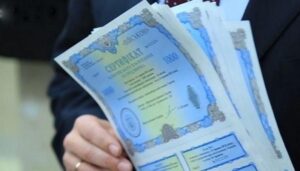
The National Bank of Ukraine considers the issuance of military domestic bonds (OVDPs) to be the main and most effective instrument for covering the budget deficit in wartime. This was announced by First Deputy
Head of the NBU Serhiy Nikolaychuk in an interview with the Interfax-Ukraine news agency.
According to him, high demand from banks and the population allows the Ministry of Finance to successfully place securities while maintaining macrofinancial stability. “OVDPs remain a safe and most transparent way to finance the state’s needs,” he said.

US President Donald Trump says he is closely monitoring the actions of Vladimir Putin and Ukrainian President Volodymyr Zelensky and intends to put an end to the killings in the Russian-Ukrainian war.
During a press conference in Washington on Tuesday, when asked by a reporter if there would be any consequences for Putin and Zelensky if they did not meet, the US president replied: “We’ll see what happens, we’ll see what they do. I am watching this very closely.“ ”Last week, they lost 7,317 soldiers for no reason. Both Russians and Ukrainians. I want to put an end to this,” Trump added.
As reported, on August 30, Trump confirmed the holding of trilateral negotiations on the war with Zelensky and Putin and acknowledged that the parties are not yet ready for bilateral negotiations.
On September 2, Trump said he was extremely disappointed with Vladimir Putin in the context of the Russian-Ukrainian war, despite his excellent relationship with him, and announced an aid package without specifying its size and content, emphasizing that this was not “a matter for Ukraine.”
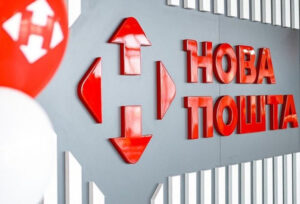
Nova Poshta, the leader in express delivery in Ukraine and part of the Nova Group, increased its consolidated net profit by 18.6% in the first half of 2025 compared to the same period last year, to UAH 1 billion 765 million, while consolidated net revenue increased by 22% to UAH 29.829 billion.
According to the company’s report published in the information disclosure system of the National Securities and Stock Market Commission (NSSMC), the company’s gross profit increased by 19% compared to the same period last year, to UAH 7 billion 205 million. Operating profit, according to the consolidated report, increased by 17% to UAH 3.72 billion.
Earlier it was reported that in the second quarter of 2025, Nova Poshta increased its unconsolidated net profit by 2.6% compared to the same period in 2024, to UAH 905.45 million. According to the company’s reports on its website and in the NSSMC information disclosure system, revenue in the second quarter increased by 22.9% to UAH 12.71214 billion. In the first half of this year, Nova Poshta’s net profit decreased by 19.6% to UAH 1 billion 195.74 million, while revenue increased by 22.1% to UAH 24 billion 571.27 million, according to the published data. It was noted that gross profit for the first half of the year increased by 30.8% to UAH 5 billion 55.3 million, while operating profit increased by 45.6% to UAH 2 billion 443.82 million.
As of mid-year, Nova Poshta had obligations on three bond issues of series “E”, “F” and “G” series bonds, respectively, in the amount of UAH 995.82 million with maturity on July 30 this year, UAH 998.45 million with maturity on June 1 next year, and UAH 999.38 million with maturity on May 2, 2027. The interest rate on bonds “F” and “G” is 16% per annum. The company already has five redeemed bond issues since August 2020 for a total amount of UAH 3.6 billion.
In August 2025, the company fully placed series “H” bonds with a total nominal value of UAH 1 billion after the redemption of series “E” bonds with the same nominal value on July 30.
The main activity of Nova Poshta remains the express delivery of documents, parcels, and palletized large-sized cargo. The company is the leader in express delivery in Ukraine. Its ultimate beneficial owners are Volodymyr Poperechnyuk and Vyacheslav Klimov.
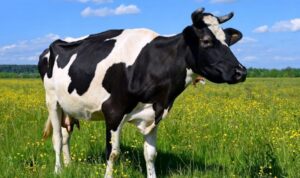
Cattle slaughter in July 2025 amounted to 14.8 thousand tons, which is 6 thousand tons more (+63%) than in June 2025 and 1 thousand tons more (+7%) than in July 2024, according to the Association of Milk Producers (AMP).
The industry association noted that in July 2025, enterprises produced 50% of beef from the total slaughter volume, and private farms produced 50%.
Cattle slaughter volumes in January-July 2025 amounted to 98.5 thousand tons, which is 4 thousand tons less (-4%) compared to the same period in 2024.
The AVM noted that in July, cattle slaughter volumes at agricultural enterprises amounted to 7.4 thousand tons, which is 1 thousand tons more (+16%) compared to June 2025 and 300 tons more (+4%) compared to July 2024. In January-July 2025, cattle slaughter volumes at agricultural enterprises amounted to 46 thousand tons, which is 1.3 thousand tons more (+3%) compared to the same period last year.
In private households, cattle slaughter volumes in July amounted to 7.4 thousand tons, which is 5 thousand tons more (+174%) than in June of this year and 700 tons more (+10%) than in July 2024. In January-July 2025, cattle slaughter in private households amounted to 52.5 thousand tons, which is 5.7 thousand tons less (-10%) than in the same period last year.
At the same time, the largest share (59%) of animals slaughtered was sold by agricultural enterprises in the Kyiv (35.8 thousand head), Poltava (24.6 thousand head), Cherkasy (18 thousand heads), Chernihiv (16.4 thousand heads), and Vinnytsia (14.9 thousand heads) regions.

Cattle slaughter in July 2025 amounted to 14.8 thousand tons, which is 6 thousand tons more (+63%) than in June 2025 and 1 thousand tons more (+7%) than in July 2024, according to the Association of Milk Producers (AMP).
The industry association noted that in July 2025, enterprises produced 50% of beef from the total slaughter volume, and private farms produced 50%.
Cattle slaughter volumes in January-July 2025 amounted to 98.5 thousand tons, which is 4 thousand tons less (-4%) compared to the same period in 2024.
The AVM noted that in July, cattle slaughter volumes at agricultural enterprises amounted to 7.4 thousand tons, which is 1 thousand tons more (+16%) compared to June 2025 and 300 tons more (+4%) compared to July 2024. In January-July 2025, cattle slaughter volumes at agricultural enterprises amounted to 46 thousand tons, which is 1.3 thousand tons more (+3%) compared to the same period last year.
In private households, cattle slaughter volumes in July amounted to 7.4 thousand tons, which is 5 thousand tons more (+174%) than in June of this year and 700 tons more (+10%) than in July 2024. In January-July 2025, cattle slaughter in private households amounted to 52.5 thousand tons, which is 5.7 thousand tons less (-10%) than in the same period last year.
At the same time, the largest share (59%) of animals slaughtered was sold by agricultural enterprises in the Kyiv (35.8 thousand head), Poltava (24.6 thousand head), Cherkasy (18 thousand heads), Chernihiv (16.4 thousand heads), and Vinnytsia (14.9 thousand heads) regions.
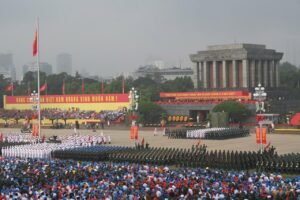
On September 2, 2025, Vietnam will celebrate the 80th anniversary of its founding.
80 years is a special historical milestone for the entire country, the entire nation, and every Vietnamese person. It is not only a great national holiday, but also a symbol of the spirit of solidarity, patriotism, and unbreakable will of all generations of the Vietnamese people who sacrificed themselves and dedicated themselves to the independence and freedom of their homeland.
It was on September 2, 1945, in the historic Ba Dinh Square, that President Ho Chi Minh, the great leader of the Vietnamese people, read the “Declaration of Independence,” marking the beginning of the Democratic Republic of Vietnam, which is now the Socialist Republic of Vietnam. This event opened a new era in the history of the nation—an era of independence and freedom.
To achieve this historic moment, the entire Vietnamese people rose up unanimously and carried out the August Revolution, putting an end to 80 years of French colonial rule. However, the path to complete independence and reunification did not end there. Vietnam had to go through two more difficult wars of resistance against the French colonizers and American imperialists.
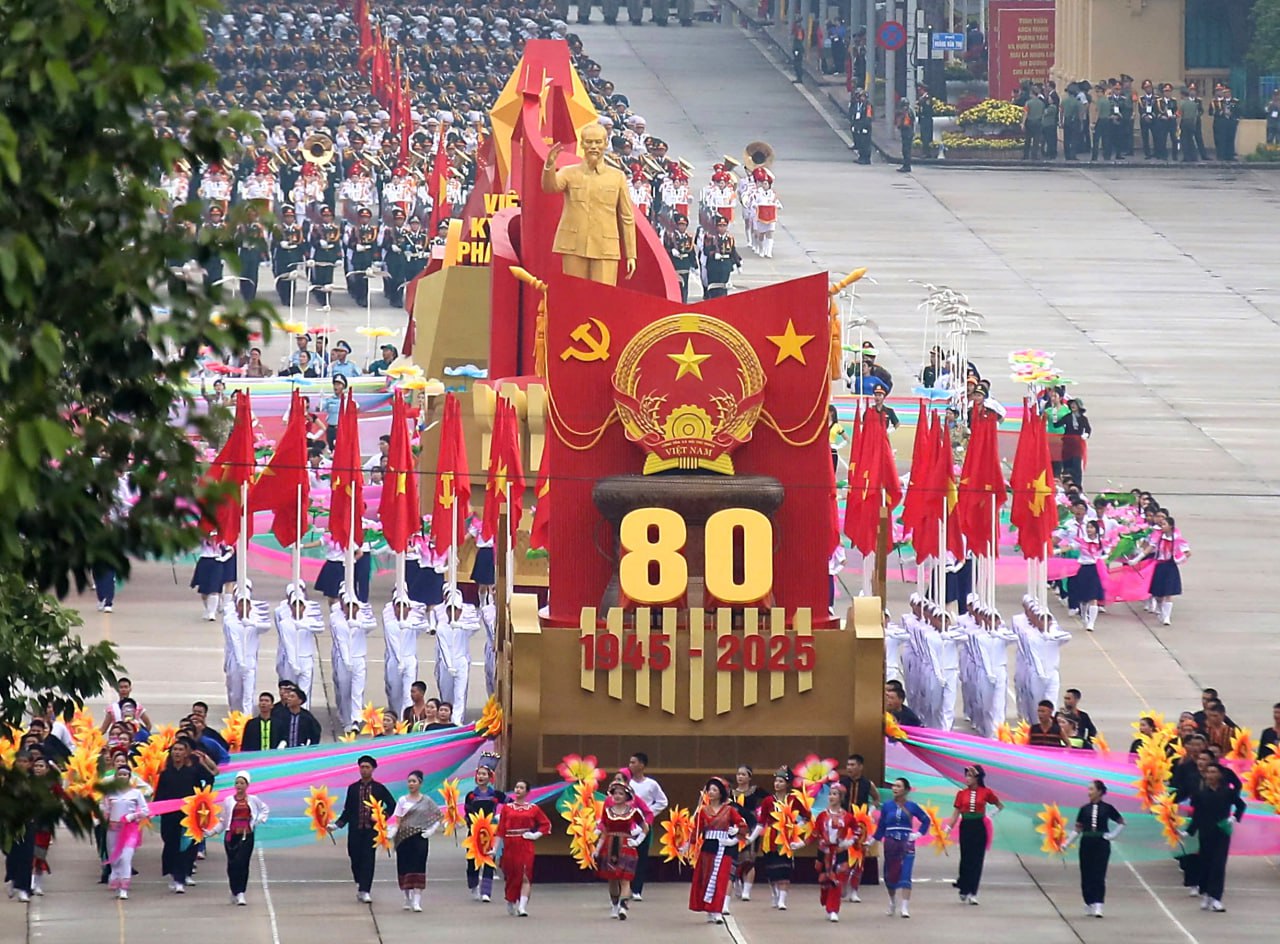
Inspired by President Ho Chi Minh’s call that “nothing is more precious than independence and freedom,” the Vietnamese people fought with unwavering courage, enduring incredible hardships, losses, and sacrifices, and finally, in 1975, gained independence, freedom, and reunited the country.
From a besieged and isolated country, backward and severely devastated by 30 years of war against foreign invaders, Vietnam has transformed itself into a state with a rapidly growing economy, ranking among the top 35 economies in terms of GDP and among the top 20 economies in the world in terms of trade.
Vietnam pursues an independent and autonomous foreign policy aimed at maintaining peace, cooperation, and development, adheres to the principles of multilateralism and diversity, and strives to be a friend, reliable partner, and responsible member of the international community.
In terms of national defense, Vietnam has established regular, elite, and gradually modernized armed forces and adheres to a policy of “four no’s” (no military alliances, no foreign bases, no collusion with one country against another, and no use or threat of force).
Vietnam currently has diplomatic relations with 194 countries around the world and attaches great importance to developing friendly and mutually beneficial relations with all its traditional friends, among which Ukraine occupies a special place.
For many years, Vietnam and Ukraine have maintained comprehensive partnership and cooperation in various fields, from economics and trade to science, technology, culture, and humanitarian exchanges.
Many generations of Vietnamese have studied and worked in Ukraine. Many of them now hold important positions in government agencies, and some are successful businesspeople. For example, Vietnam’s first billionaire, Pham Nhat Vuong, earned his first money while living in Kharkiv in the early 1990s, when he launched the instant noodle brand “Mivina.”
Many Ukrainian specialists and engineers also came to Vietnam to help the country with its post-war reconstruction.
Thousands of Vietnamese chose Ukraine as their second home and stayed here after studying and working.
Despite the challenges posed by the war, bilateral trade remains stable: in the first half of 2025, bilateral trade grew by 30% compared to the same period in 2024, increasing from $430 million to $560 million.
Looking ahead, as confirmed by Vietnamese President Le Quang in his congratulatory message to President Zelensky on the occasion of the 34th anniversary of Ukraine’s independence, Vietnam is ready to further strengthen cooperation with Ukraine in various fields, from trade and economy to science, technology, and culture, in the interests of the peoples of both countries.